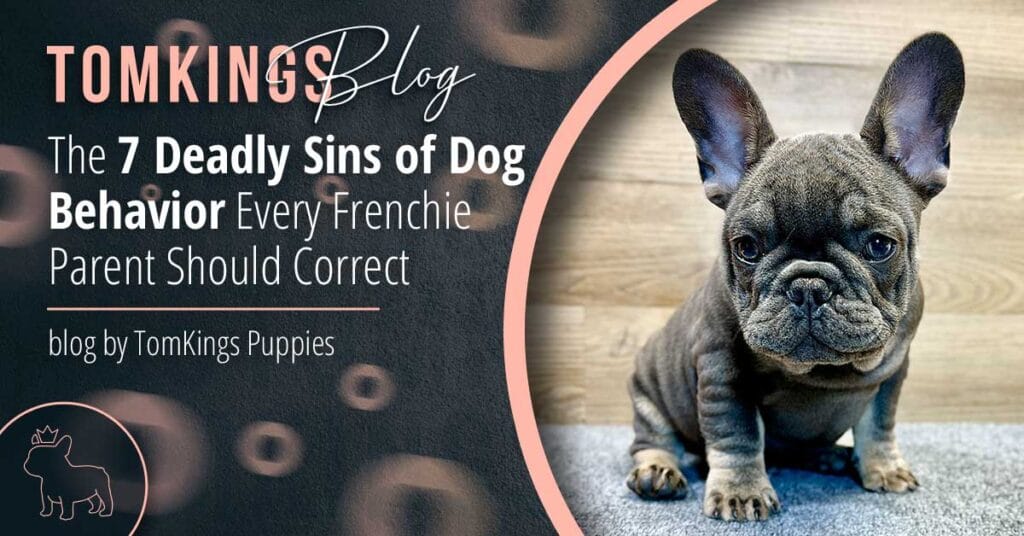Reading time: 5 minutes
A few weeks ago, we shared some common mistakes that new Frenchie parents often make. As dog owners, we carry a huge responsibility in helping our furry friends grow into obedient and well-balanced family members. Just like us, dogs need guidance, structure, and lots of love. But if we don’t start training early, especially when it comes to setting boundaries, it can lead to serious behavioral issues down the road. Breeders also play a huge role in early socialization—without the right foundation, puppies can develop unwanted behaviors later in life.
At TomKings Puppies, we believe that prevention is key. Whether you’re a first-time dog owner or you’ve had pets for years, it’s important to recognize certain behaviors that should never be tolerated in your French Bulldog. These “sins” not only disrupt the peace in your home but can also create long-term problems if left unchecked. In this article, we’ll go over the 7 deadly sins of dog behavior, what they mean, and why it’s crucial to address them right away. If you can’t correct them on your own, don’t worry—there’s always help available from professional trainers!


Table of Contents
Toggle1. Aggressive Behavior Within the Family
Aggression towards family members is one of the most alarming behaviors a dog can show. This can include growling, snapping, or even biting, which is an absolute red flag. A dog should feel safe and calm within the family pack, and if they’re displaying aggression, it means something is off. This behavior must be taken very seriously and addressed immediately, as there is no greater sin for a dog than turning against their own owner or family. Sometimes, this aggression can stem from fear or anxiety, but no matter the cause, it’s a behavior that must be corrected as soon as possible. After all, your Frenchie is part of the family, and there’s no room for aggression in a loving household.
2. Aggression Towards Strangers and Other Dogs
While Frenchies are usually known for their affectionate nature, some of them might act aggressively toward strangers or other dogs. This can make walks or visits to the park stressful for everyone involved. Aggression toward strangers might come from a lack of socialization or a fear of the unknown. If your dog feels they need to “protect” you from others, they might lash out. It’s important to address this behavior before it gets worse, as it can lead to dangerous situations if not properly managed.


Ultimate Guide
to Raising a Frenchie
3. Running Away From Home
If your Frenchie keeps running away or escaping from home, it’s not just frustrating—it’s dangerous. Dogs that run away are exposed to a range of risks, from getting lost to encountering traffic or other animals. This behavior usually indicates a lack of boundaries or unfulfilled needs, like the need for more exercise or stimulation. Frenchies, like all dogs, thrive when they know their limits, and making sure they feel safe and content at home is essential to stopping this behavior.
4. Ignoring Recall Commands (Not Coming When Called)
We’ve all been there—calling our pup’s name, only to watch them completely ignore us! While it might seem harmless, not coming when called can actually be a serious issue, especially in public spaces. If your Frenchie doesn’t respond to your commands, it can put them in dangerous situations, like running into traffic or approaching an aggressive dog. Teaching your dog to come when called is a basic yet vital skill for their safety. If they consistently ignore you, it’s a sign that the leadership balance in your relationship needs adjustment.


5. Eating Food Without Permission
Stealing food off the table or counter might seem funny the first time, but it quickly becomes a bad habit. A Frenchie that helps themselves to food whenever they feel like it is showing a lack of respect for boundaries. Not only is it rude behavior, but it can also be dangerous—especially if they get into food that isn’t safe for dogs, like chocolate or grapes. Setting clear boundaries around food is key to preventing this.
6. Disrespect Towards Humans (Jumping on People)
Jumping on people—whether it’s family members or guests—might seem like a playful act, but it’s actually a sign of disrespect. When a dog jumps on someone, they’re trying to take control of the situation. While it may not seem like a big deal with a small dog like a Frenchie, it’s still important to correct this behavior early on. Your Frenchie should learn to greet people calmly and respectfully, understanding that jumping is not acceptable.
7. Displaying Dominance (Mounting or Humping)
Mounting or humping isn’t just an embarrassing behavior—it’s a clear sign of dominance. When your Frenchie exhibits this behavior in your presence, they’re essentially testing the boundaries of who’s in charge. In a well-structured household, the owner should always be the leader of the pack. Allowing your dog to display dominant behaviors like this can lead to bigger issues down the road, so it’s crucial to nip it in the bud.
If Your Frenchie Shows These Behaviors
If your Frenchie is displaying any of these behaviors (even just a few), it’s a sign that the relationship between you and your dog isn’t balanced. This doesn’t mean your Frenchie is a “bad dog,” but it does indicate that they might not fully understand what’s expected of them or who’s in charge. These problematic behaviors, especially aggression, are clear signs of two major issues: a lack of bonding and an unclear hierarchy.


Bonding – The Foundation of Your Relationship
A strong bond between you and your Frenchie is the foundation of a healthy relationship. When a dog shows problematic behaviors, one of the main causes is often a weak or nonexistent bond. In these cases, the dog doesn’t understand who they depend on or who’s responsible for their well-being. Bonding is crucial because without it, your Frenchie sees everyone as equal, and this confusion leads to disobedience.
To strengthen this bond, it’s essential to communicate on a basic level—starting with their most fundamental needs, like feeding. When you provide food, your Frenchie should understand that you are the one taking care of them. This simple act reinforces the idea that they rely on you. As your dog learns to trust and depend on you for their needs, they will also begin to respect you as their leader. Without this understanding of dependency, it’s hard to show your Frenchie who’s in charge.
For more ideas on how to strengthen your bond with your Frenchie, we’ve collected 10 tips to build a strong bond with your Frenchie in this article.
Available puppies
Available Puppies
Establishing Leadership Through Rules
Once the bond is in place, the next step is to establish clear rules. In any family, or “pack,” the owner is the leader, and your Frenchie should recognize that you’re the one in charge. As the pack leader, you set the boundaries, and it’s important for your Frenchie to know that there are things you can do that they cannot. Without this understanding, your dog might test the limits or act out. For example, you may decide that from now on, they’re not allowed on the couch or in the bedroom—not because the door is closed, but because it’s the rule. Other important rules include not jumping on people or not going through the door or gate before you.
Frenchies are smart dogs, and they thrive when there’s structure. In a well-functioning household, there should be at least 10 clear rules that your dog follows. This helps your Frenchie understand the hierarchy and their place in the pack. It’s important that everyone in the family consistently enforces these rules. Over time, your Frenchie will naturally fall into line, respecting both you and the boundaries you’ve set.
For more tips on becoming the leader of your pack, check out this article.
The Most Effective Punishment: Exclusion from the Pack
If your Frenchie commits one of the “sins” we’ve discussed, the most effective way to correct them is by temporarily excluding them from the “pack.” This means ignoring your dog entirely—no eye contact, no talking, no touching—from both you and the entire family. This time-out can last for 1-2 hours, but in cases of serious behaviors like aggression, it may need to continue for several days. Since dogs are highly social animals, being part of the family is crucial to them. This kind of exclusion is one of the most powerful ways to show them that their behavior is unacceptable.


When to Seek Professional Help
If your Frenchie is still young and displaying these behaviors, there’s a good chance they can be corrected with the methods we’ve discussed. Establishing a healthy bond and clear leadership can create a peaceful and happy environment for both of you. If you address these areas, you’ll find that many behavioral problems will naturally improve over time. Puppies are much more adaptable, so it’s important to start addressing these behaviors as early as possible so they don’t become ingrained habits.
However, if you’re dealing with an adult dog, the situation can be more challenging. These behavioral patterns may be deeply ingrained, making them harder to change on your own. In these cases, seeking the help of a professional dog trainer is often the best course of action. A trainer can come to your home, observe your dog’s behavior in real-life situations, and offer tailored advice on how to correct it.
Don’t be afraid to ask for help—sometimes, professional guidance is exactly what you and your Frenchie need to restore balance and harmony to your relationship.
If you’d like to learn more about Frenchies, join our Facebook group called TomKings Frenchie Family to read our Frenchie parents’ experiences.
The article is based on the expert knowledge of the TomKings Puppies team who have been breeding French Bulldogs for 15 years. All the pictures in the post belong to them and their customers, and show puppies from their breed. Check their available French Bulldog puppies, or if you have any questions or comments let us know below the article.




























